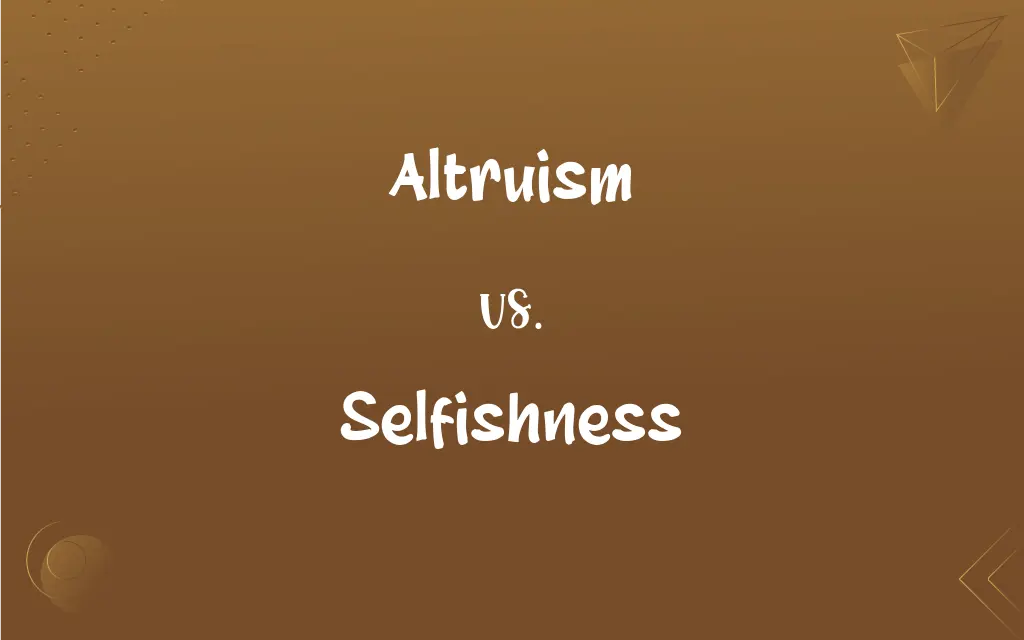Altruism vs. Selfishness: What's the Difference?
Edited by Aimie Carlson || By Janet White || Published on November 4, 2023
Altruism is selflessly acting for others' benefit, while Selfishness prioritizes one's own interests over others'.

Key Differences
Altruism represents a selfless concern for the well-being of others. It's the act of putting others' needs above one's own without expecting any return. On the contrary, Selfishness is characterized by prioritizing one's own needs, desires, or interests over those of others.
While Altruism often leads individuals to make sacrifices for the greater good, Selfishness may cause them to act in ways that could be detrimental to others to benefit themselves.
It's essential to recognize that Altruism is often celebrated in many cultures as it promotes cooperation and harmony. In contrast, Selfishness is frequently frowned upon since it can lead to discord and disputes within communities.
Altruism can manifest in various acts, from simple gestures like holding the door for someone to significant actions like donating a kidney. Selfishness, meanwhile, might be seen in behaviors like not sharing resources or taking more than one's fair share.
While Altruism is often associated with empathy and compassion, Selfishness is linked to individualism and a lack of consideration for others.
ADVERTISEMENT
Comparison Chart
Primary Concern
Others' well-being
One's own interests
Outcome
Benefits others, potentially at one's own expense
Benefits oneself, potentially at others' expense
Social Perception
Generally viewed positively
Often viewed negatively
Associated Traits
Empathy, compassion
Individualism, lack of consideration
Examples
Donating to charity, volunteering
Not sharing, taking more than one's share
ADVERTISEMENT
Altruism and Selfishness Definitions
Altruism
Prioritizing others' needs over one's own.
She showed her Altruism by working tirelessly for the homeless shelter.
Selfishness
Placing one's own needs or desires above those of others.
His Selfishness was clear when he ate the last slice of cake without asking.
Altruism
The opposite of selfishness, marked by generosity and selflessness.
The community praised her Altruism when she donated her lottery winnings.
Selfishness
Acts driven primarily by personal gain or benefit.
Her Selfishness prevented her from seeing the bigger picture.
Altruism
The selfless concern for the well-being of others.
The billionaire's significant donation to the hospital was an act of pure Altruism.
Selfishness
Prioritizing oneself at the expense of others.
The business's environmental harm was a result of corporate Selfishness.
Altruism
A dedication to helping others, even at personal cost.
His Altruism led him to adopt several rescue animals.
Selfishness
A lack of consideration for others.
The team lost because of one player's Selfishness in not passing the ball.
Altruism
Acts that benefit others without expecting anything in return.
The teacher's Altruism was evident when she bought supplies for her students from her pocket.
Selfishness
The opposite of altruism, characterized by self-centered actions.
The crowd disapproved of the athlete's Selfishness during the game.
Altruism
Unselfish concern for the welfare of others; selflessness.
Selfishness
Concerned chiefly or excessively with oneself, and having little regard for others
A selfish child who wouldn't share toys.
Altruism
(Zoology) Instinctive behavior that is detrimental to the individual but favors the survival or spread of that individual's genes, as by benefiting its relatives.
Selfishness
Showing or arising from an excessive concern with oneself and a lack of concern for others
A selfish whim.
Altruism
Regard for others, both natural and moral without regard for oneself; devotion to the interests of others; brotherly kindness.
Selfishness
The quality of being selfish; the condition of putting one's own interests before those of others.
Altruism
Action or behaviour that benefits another or others at some cost to the performer.
Selfishness
The quality or state of being selfish; exclusive regard to one's own interest or happiness; that supreme self-love or self-preference which leads a person to direct his purposes to the advancement of his own interest, power, or happiness, without regarding those of others.
Selfishness, - a vice utterly at variance with the happiness of him who harbors it, and, as such, condemned by self-love.
Altruism
Regard for others, both natural and moral; devotion to the interests of others; brotherly kindness; - opposed to egoism or selfishness.
Selfishness
Stinginess resulting from a concern for your own welfare and a disregard of others
Altruism
The quality of unselfish concern for the welfare of others
FAQs
What does Altruism mean?
Altruism refers to selflessly acting for the benefit of others.
How can one practice Altruism?
Volunteering, donating, or simply helping others in daily life showcases Altruism.
How does Altruism benefit society?
Altruism promotes cooperation, harmony, and mutual support within communities.
Can Selfishness be disguised as Altruism?
Yes, sometimes actions may appear Altruistic but are driven by self-interest.
Is Selfishness always negative?
While often viewed negatively, Selfishness can sometimes be a means of self-preservation.
Can Selfishness be beneficial?
In some scenarios, Selfishness can lead to self-improvement or motivate achievement.
Can Selfishness lead to loneliness?
Excessive Selfishness might alienate others, potentially causing loneliness.
Are humans naturally Altruistic or selfish?
This is debated, but many believe humans can exhibit both Altruism and Selfishness.
Does Altruism always require sacrifice?
Not always, but Altruism often involves prioritizing others' needs.
Can Altruism be learned?
While some believe it's innate, many think Altruism can be nurtured.
Are there degrees of Selfishness?
Yes, Selfishness can range from minor acts to significant disregard for others.
What's the opposite of Altruism?
Selfishness is often considered the opposite of Altruism.
Can one be both Altruistic and selfish?
Yes, individuals can display both traits in different situations.
Why is Altruism important in society?
It fosters trust, cooperation, and a sense of community.
Does society promote Selfishness?
Some argue that certain aspects of modern society encourage Selfishness.
Can Altruism be harmful?
Extreme Altruism might lead to neglecting one's own needs.
Why do people act with Selfishness?
Reasons vary, including survival, desire for power, or lack of empathy.
Can cultures influence levels of Altruism?
Yes, cultural norms and values can shape Altruistic behaviors.
Is Altruism limited to humans?
No, some animals also display Altruistic behaviors.
How can one reduce Selfishness?
Self-awareness, empathy training, and practicing generosity can help.
About Author
Written by
Janet WhiteJanet White has been an esteemed writer and blogger for Difference Wiki. Holding a Master's degree in Science and Medical Journalism from the prestigious Boston University, she has consistently demonstrated her expertise and passion for her field. When she's not immersed in her work, Janet relishes her time exercising, delving into a good book, and cherishing moments with friends and family.
Edited by
Aimie CarlsonAimie Carlson, holding a master's degree in English literature, is a fervent English language enthusiast. She lends her writing talents to Difference Wiki, a prominent website that specializes in comparisons, offering readers insightful analyses that both captivate and inform.






































































